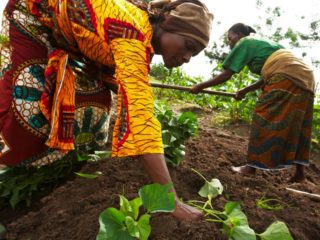FAO, WFP to assist farmers in Nigeria, Congo
The Food & Agriculture Organization (FAO) and the World
Food Programme (WFP) have stepped up efforts to assist farmers and alleviate
hunger in Nigeria and Congo.
In north-eastern Nigeria, hunger has considerably declined
for the first time since the Boko Haram crisis. According to the latest Cadre
Harmonise food security analysis, the number of people living in the three
states affected by violence who are facing acute hunger has halved since last
August from 5.2 million to 2.6 million.
The analysis attributed this to an overall improved security
situation and the ramping up of humanitarian and longer-term livelihoods
assistance by the Nigerian government and its partners.
FAO has helped farmers in the area by providing cowpea,
maize, millet, sorghum, vegetable seeds and fertilises to one million people -
internally displaced people, returned refugees and host communities - to get
them through the last rainy season which ended in September 2017.
Food stocks become low during this period. The harvest
season is now winding down and communities are transitioning to the next dry
season and a new planting phase. FAO is aiming to boost local production
through the distribution of farming kits, vegetable seeds, fertilisers and
irrigation equipment across 780,000 people in three states.
In the Democratic Republic of Congo, FAO and WFP will be
working in the Greater Kasai area, which has been affected by conflict. FAO
will supply food-growing kits, including cultivation tools and fruit and
vegetable seeds to allow families to eat for two months and sell any food that
is uneaten.
Citizens will receive training in raising guinea pigs as a
source of protein, and in processing and marketing bamboo to use for fishing
equipment, canoes, fences, firewood and utensils. Additionally, WFP will
distribute fortified maize, legumes, fortified vegetable oil and iodised salt,
as well as cash.
Children aged from six months to five years, as well as
pregnant and breastfeeding women will be treated for three months with nutritious
supplements. The joint initiative will be rolled out in partnership with the
DRC Ministry of Agriculture and local NGOs.
Greater Kasai was a maize-producing region before the
conflict, which has forced a million people out of their homes and off their
land. An estimated 3.2 million people are now severely hungry and child
malnutrition is widespread.





Comments
Post a Comment